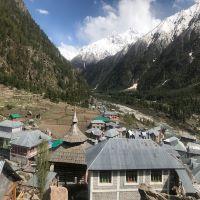
We are pleased to announce the upcoming addition to CoRSAL: the Chhitkul-Rākchham Language Resource. This rich collection was contributed by Dr. Philippe Antoine Martinez, a Postdoctoral Associate at New York University Abu Dhabi (NYUAD). His current research focus is primarily on evidentiality, a linguistic category conveying source of information, which he increasingly analyzes from the viewpoint of cognitive linguistics, based on a versatile set of data: corpus-based, elicited, playback interviews, and ethnographic. An important aspect of Philippe’s research on this topic has to do with harnessing cross-linguistic data to clarify questions related to philosophy of language, Western, Hindu and Buddhist epistemologies, and consciousness. Lesser-known languages from the Himalaya region have a say in this scholarly adventure because they exhibit some of the most complex knowledge management systems on Earth. Specific means of morphosyntactic expression, e.g., copula stacking, provide valuable insights.
Philippe received training in language documentation and description tools and methods from SOAS – University of London. He started working on Chhitkul-Rākchham (West-Himalayish) in 2016-2017, having a keen interest in Himalayan linguistics and culture. His specialization lies in morphosyntax, with a solid grounding in Indo-European languages (French, English, Danish, Serbian, and Hindi). As a functionalist, Philippe attaches importance to the collection of rich metadata, to the immediate context of an utterance (anaphora, discourse genre, social status of the participants), and to how language unfolds in interaction. Equipped with an ethnographic sensibility, he takes advantage of having graduated in three disciplines (economics, political science, and linguistics) to collect broad sociolinguistic information.
Philippe’s PhD thesis (2021) contains a 200-page linguistic description of Chhitkul-Rākchham, heretofore insufficiently described. He has now gathered enough materials to write a comprehensive grammar of the language. In consort with community members, Philippe recently initiated a dictionary project, envisioned as a tool for language maintenance, ‘relational lexicography’ being a domain where he is eager to acquire an expertise in the long-term. Philippe is also intent on broadening the perspective to Trans-Himalayan varieties spoken in Eastern India and Nepal, thus strengthening the typological dimension of his research.
India captured his attention in light of its radical language and social diversity. Raising awareness of lesser-known languages and language endangerment there is one of his absolute commitments, having realized that ‘empowerment research’, or fieldwork undertaken by trained community members, is the panacea and must be pursued more systematically. Philippe strives to become an outstanding mentor, immersing himself in the advancement of a type of learning that is holistic, multi-disciplinary, collaborative, and problem-solving oriented.
Stay tuned for this collection in Spring 2023!
